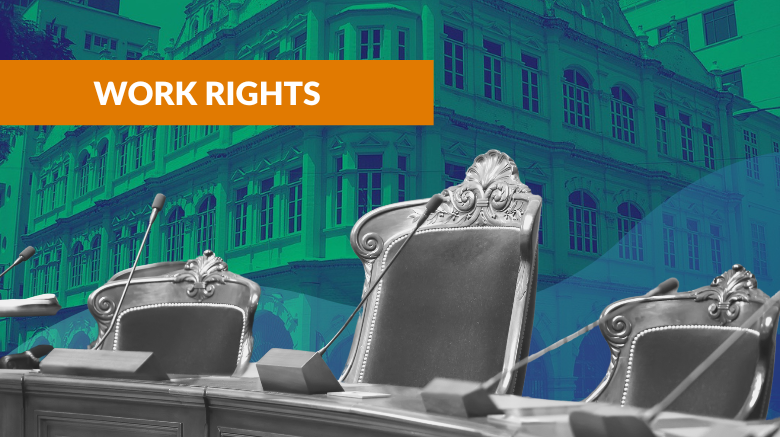*A pseudonym is used to protect the anonymity of the client.
The Industrial Court of Malaysia ruled in favor of a refugee worker who filed a claim for unlawful dismissal in the Industrial Court. This decision recognized, once again, the right of all workers regardless of their legal status to file a claim in the Industrial Court of Malaysia. Despite the fact that refugees do not have the right to work legally in Malaysia, case law indicates that they can still assert statutory employment rights in Malaysian courts.
Mr. Ahmed* is a 40-year-old refugee from Yemen. In 2011, he was forced to flee his home country and seek asylum in Malaysia. He worked at different restaurants doing odd jobs to survive and support his family back in Yemen. He then started working as a distributor for a factory for three years until February 2020 when everything turned upside down for him. The company did not pay his wages in full, followed by a text message from the employer issuing a “Work Stop Order” Notice due to the Movement Control Order (MCO) restrictions during the pandemic. Mr Ahmed was informed that he would be called back to work when the situation allows. “I understood the damages that COVID-19 pandemic has caused on many businesses, so I followed the orders of my employer and did not go to work,” Mr Ahmed told our staff.
Mr. Ahmed was under the impression that the company would pay all of his overdue salary and call him back to work when the business situation has improved. However, the employer stopped responding to Mr Ahmed’s messages and refused to pay the outstanding wages as agreed. “I sent a letter to my boss to inquire about the status of my employment and demand my right, my salary, because I have to survive,” Mr. Ahmed explained. “I gave them 7 days’ notice to reply to me, if not, I will then consider that I have been unlawfully dismissed and I told them I will take legal action”. Sure enough, the company failed to respond to Mr. Ahmed’s letter, leading him to take legal action.
“I went to the labour department to file a complaint but I was told that I cannot get help because I don’t have a work visa”. Frustrated by this, Mr. Ahmed filed a police report too, but the justice system wouldn’t consider his claim simply because of his refugee status. “I felt helpless, I went everywhere, labour department, police, etc… but no one can help me because I’m a refugee here. I started feeling depressed and sad, and I wanted to give up, until my community leader told me about Asylum Access and the work they do for refugees who were denied human rights, so I contacted them.”
“Actually I had very little hope that the court would rule in my favor, but when I heard the news, I was speechless and very relieved, Alhamdulillah.”
Mr Ahmed
After our staff received his case, we supported him to take legal action and file a claim at the Industrial Court for unlawful dismissal and for his unpaid salaries, amounting to RM33,000 (~$7,500 USD). The court accepted the case and the trial took place on 8 February 2022. However, Mr. Ahmed has just been resettled to another country. The judge was empathetic towards the client’s situation and allowed him to testify through teleconference. “I was scared that the court would cancel my claim because I cannot be there physically, but when they told me I can join virtually, I was very happy.”
After considering the parties’ submissions, the Industrial Court ruled that the employer’s company pays the whole sum of RM33,000.00 (Ringgit Malaysia Thirty Three Thousand Only) to the client. “Actually I had very little hope that the court would rule in my favor, but when I heard the news, I was speechless and very relieved, Alhamdulillah.”
Before the trial began, no issues were raised about whether the Industrial Court had jurisdiction to hear the claim because Mr. Ahmed did not possess a work permit. Furthermore, the judge went out of his way to ensure that the client was comfortable speaking as he was stationed in an asylum center in the resettlement country at the time of the trial. “I’m so grateful to the judge, but more grateful to AAM staff and lawyers who gave me hope to fight for my right”. “I had faith in God and in humanity, and faith in the lawyers and Asylum Access staff, thank you all for standing with me.” Mr. Ahmed told our staff.
When asked about what he misses the most about Malaysia, Mr. Ahmed said “Malaysia is one of the most beautiful countries in the world, I love the nature and the weather, the people are mostly very friendly, the only thing that pushed me away from continuing to live there is inhumane policies towards refugees, even though the court ruled in my favor, I would still be at huge risk of exploitation, arrest, detention and possibly deportation.”
The facts of Mr. Ahmed’s cases are not uncommon amongst refugee workers, documented or otherwise. The Industrial Court decision marks a significant step in ensuring that moving forward, marginalized groups like refugee workers are able to assert their human rights and access justice through the Labour Courts.

